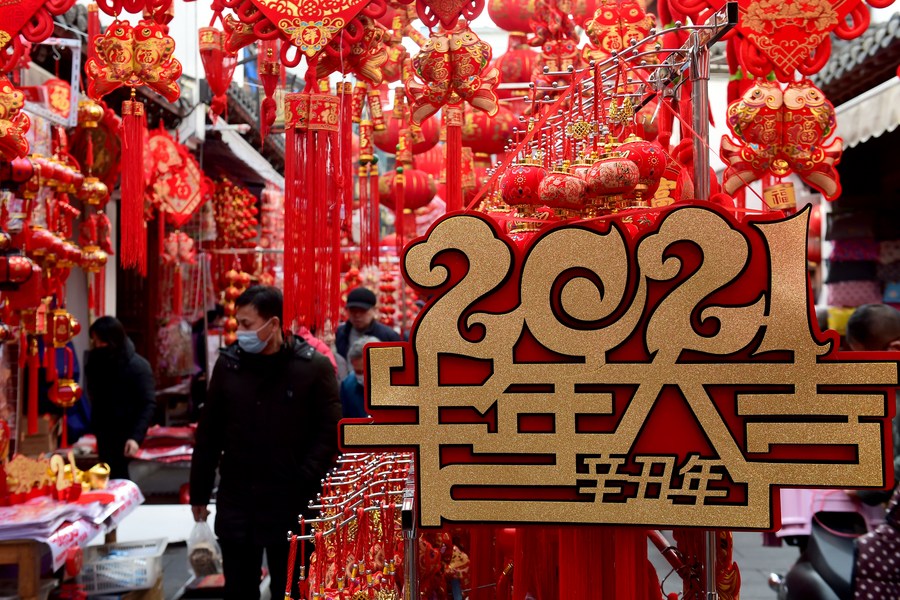Stay-at-home economy to shine in Lunar New Year holiday
The blossoming stay-at-home economy is likely to break new ground for growth and market size in China, as people have been encouraged to stay where they are for the annual Spring Festival holiday to stem the spread of the COVID-19 epidemic.
The blossoming stay-at-home economy is likely to break new ground for growth and market size in China, as people have been encouraged to stay where they are for the annual Spring Festival holiday to stem the spread of the COVID-19 epidemic.

Residents shop for Chinese Lunar New Year decorations at a market in Hefei, east China's Anhui Province, Jan. 30, 2021. (Xinhua/Huang Bohan)
"I've bought a lot of food and snacks online, and will probably spend most of the holiday binge eating and binge-watching TV," said Huang Jingjing, a 29-year-old bank employee who has decided to stay in Beijing instead of returning to her hometown in east China's Jiangsu Province for the upcoming seven-day holiday.
The Spring Festival, or the Chinese Lunar New Year, is an important occasion for family reunions, which falls on Feb. 12 this year.
"It's a pity that I'm not going to celebrate the holiday with my family, but with so many home entertainment options, I don't think I'll be bored or lonely," Huang said.
In China, consumer preferences have been shifting toward e-commerce and online entertainment and education for over a decade. The COVID-19 epidemic, however, has accelerated the trend and proven to be a boon to companies that serve the stay-at-home economy.
Partly fueled by the epidemic, China's online sales surged by 14.8 percent year on year to 9.8 trillion yuan (about 1.52 trillion U.S. dollars) in 2020, making China the world's largest online retail market for an eighth straight year.

A visitor walks in the ancient Maotang Village in Yuhang District of Hangzhou, capital of east China's Zhejiang Province, Jan. 22, 2021. (Xinhua/Xu Yu)
Ahead of the Lunar New Year holiday that normally sparks the biggest mass movement of humans on the planet, Chinese authorities advised migrant workers and residents to stay put, pledged to guarantee sufficient supplies of daily necessities and asked e-commerce platforms and logistics companies to ensure normal operation during the period.
"We expect to see demand for at-home consumption continue to explode this year, especially during the Lunar New Year holiday," said Wang Nian, an associate fellow with the Institute of Market Economy under the Development Research Center of the State Council.
Online food delivery platforms, including Meituan and Ele.me, are working with popular catering brands to launch prepackaged or semi-packaged meals for the holiday, so that younger generations will be able to celebrate the traditional festival with a feast that is easy to make.
Merchants are also targeting different groups of people by providing customized takeaway meal kits, such as single-person dinner packages and family reunion dinner packages for six to 10 persons, in a bid to woo more consumers.
"The boom in online consumption will make up for the reduction in offline consumption," Wang said.
Consumer spending during the Lunar New Year holiday is likely to be less than normal years, due to measures to reduce people's movement. However, given the low comparison base in 2020, China will still report a year-on-year consumption growth during the holiday, Wang said.

